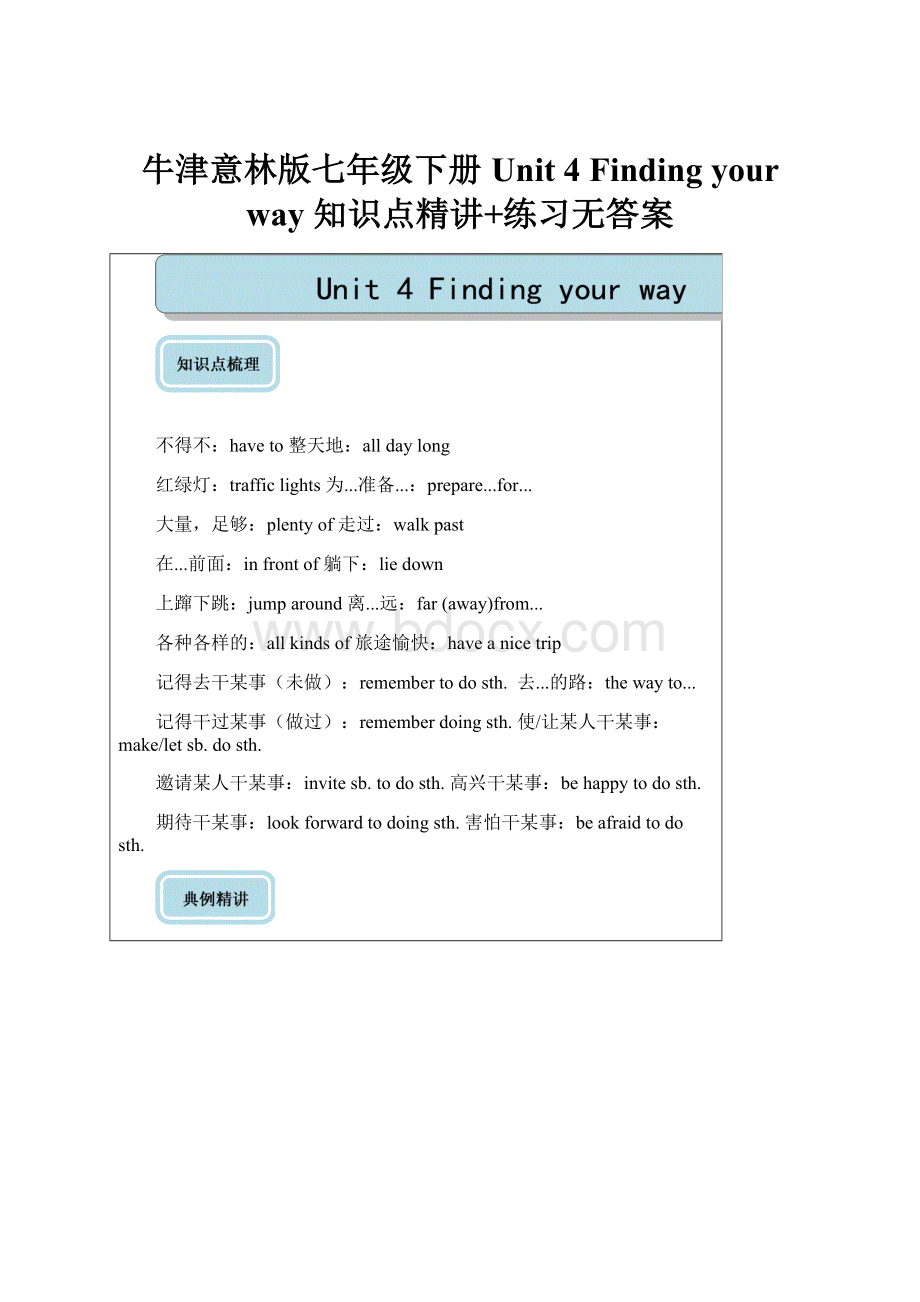牛津意林版七年级下册Unit 4 Finding your way 知识点精讲+练习无答案.docx
《牛津意林版七年级下册Unit 4 Finding your way 知识点精讲+练习无答案.docx》由会员分享,可在线阅读,更多相关《牛津意林版七年级下册Unit 4 Finding your way 知识点精讲+练习无答案.docx(16页珍藏版)》请在冰豆网上搜索。

牛津意林版七年级下册Unit4Findingyourway知识点精讲+练习无答案
不得不:
haveto整天地:
alldaylong
红绿灯:
trafficlights为...准备...:
prepare...for...
大量,足够:
plentyof走过:
walkpast
在...前面:
infrontof躺下:
liedown
上蹿下跳:
jumparound离...远:
far(away)from...
各种各样的:
allkindsof旅途愉快:
haveanicetrip
记得去干某事(未做):
remembertodosth.去...的路:
thewayto...
记得干过某事(做过):
rememberdoingsth.使/让某人干某事:
make/letsb.dosth.
邀请某人干某事:
invitesb.todosth.高兴干某事:
behappytodosth.
期待干某事:
lookforwardtodoingsth.害怕干某事:
beafraidtodosth.
.要表示A在B的东部,即:
A在B的范围之内时就用“AisintheeastofB”,
例:
JapanisintheeastofAsia.日本在亚洲东部。
.如果A在B的东方,即:
A在B的范围之外,且相隔有一定的距离,就用“AliestotheeastofB”。
口语中有时可将tothe省去。
例:
Japanlies(tothe)eastofChina.日本位于中国东方。
.如果A在B的东边(侧),即:
A与B相邻接。
就用“AisontheeastofB”。
例;GuangdongisonthesouthofHunan.广东在湖南南边。
.如果把方位词当作一个整体看,或是看成一点,就用“AisattheeastofB”
例:
TherewasabigbattleatthenorthoftheLiaodongPeninsula.在辽东半岛的北边有一场大战。
.如果要表示“A位于B西面100公里处”时我们既可以说“Aliesl00kmtothewestofB”,也可以说“Alies100kmwestofB”.后者在美国口语中更为常见。
如:
Suzhoulies50milestothewestofShanghai.苏州位于上海西面50英里处。
.汉语里“东南西北”的先后顺序到英语里就变成了north,south,east,west;并由此有了下列中、英文表达上的差异。
东南方:
southeast西南方:
southwest西北方:
northwest东北方:
northeast
例:
Tianjinissituatedl20kmsoutheastofBeijing.天津位于北京东南120公里处。
.要表示方位的“偏向”时通常用by
正东偏北:
eastbynorth正南偏西:
southbywest正北偏东:
northbyeast正南偏东:
southbyeast
例:
Wearesailinginthedirectionofeastbynorth.我们正朝着正东偏北方向航行。
Theislandliessouthbyeastfromhere.那个岛位于此地的正南偏东方向。
翻译:
黑龙江在中国的东北。
____________________________________________________________
翻译:
日本在中国的东边。
____________________________________________________________
2.everybody每人,人人
everybody是复合不定代词,指代“人”,everybody着眼于全体,但是作主语时,动词要用__________,而且习惯上不能与of连用。
Everybodyishere,wecanbegintohaveameeting.大家都到了,我们可以开始开会了。
3.Ithinkwehavetogoupagain.我觉得我们不得不再上去。
_______________用作情态动词,意为“不得不”,意义与情态动词must相近。
用在肯定句中:
一般现在时态第三人称单数是___________,其他人称用haveto
例:
__________________________________________________.我们早晨不得不在七点之前到达学校。
用在否定句中:
第三人称单数是_______________,其他人称用_________________
例:
__________________________________________________.我不必每天都听音乐。
用在疑问句中:
第三人称单数在句首加_____________,hasto改为______________,其他人称用do.
例:
Milliehastoworkhardatherlessons.(改为一般疑问句)
_________________________________________________
翻译:
考试之前,我不得不努力学习。
_____________________________________________________
翻译:
我不必每天都吃那么多,因为我要减肥。
_____________________________________________________
5.crossingn.交叉路口,十字路口
常用短语:
在十字路口astreetcrossing人行街道
例:
在十字路口向右拐,你就可以看到邮局在你的右边。
crossing的动词:
vt.横穿(马路,街道)eg:
穿过街道
prep.介词(穿过,从表面穿过),使用时前面必须有动词
横穿马路。
prep.介词(穿过,从里面穿过),使用时前面必须有动词
穿过森林。
6.Walkpastthehouse,turnleftandwalkalongthepathnexttotheriver.
句子中出现三个句,Walkpastthehouse从那所房子放走过;turnleft向左拐;walkalongthepathnexttotheriver沿着紧靠河边的小路向前走。
例:
____________________________________________向右拐然后一直往前走。
在第一个红绿灯处向左拐后进入第一大街。
_________________________________.
一直向前走,然后向左拐,你将会看到一个银行。
__________________________________________________________________
1.ThespaceshipwillleavetheEarthat9a.m.宇宙飞船将在上午9:
00离开地球。
2.It’lltakeustotheMoon.它将把我们带到月球。
3.Whenwearrive,I’mgoingtowalkontheMoon.当我们到达时,我将在月球上行走。
4.Arethedogsgoingtocomewithus?
狗和我们一起来吗?
一、基本概念
表示将来某个时间要发生的动作或存在的状态,常与一些表示将来的时间状语连用。
例如:
_______________________________________________今天晚上我将在电视上看一场足球比赛。
二、基本结构
一般将来时的结构一般由“_________________”或“___________________”构成。
will是助动词,不能独立使用,前面的主语不管是什么人称,其后总用will。
在名词或代词后常简缩为’ll,并与主语连写在一起。
will的否定形式是willnot,缩略形式是_________。
三、基本句型
(1)肯定句
主语+will+动词原形+其他
_____________________________________________他将要来这儿。
主语+begoingto+动词原形+其他
________________________________________________________我们打算今天下午去爬山。
(2)否定句
主语+will+not+动词原形+其他
________________________________________________________他不去参加聚会。
主语+be+not+goingto+动词原形+其他
_________________________________________________________明天他不去做早操。
(3)一般疑问句
Will+主语+动词原形+其他?
_________________________________________________________他会帮助你学习英语吗?
Be动词(Am,Is,Are)+主语+goingto+动词原形+其他?
_________________________________________________________你打算明天下午玩电脑游戏吗?
(4)特殊疑问句:
疑问词+一般疑问句?
—Whatwillthestudentshaveforlunchtoday?
学生们今天午饭吃什么?
—Theywillhavebread.他们将吃面包。
四、注意的问题
(1)主语是第一人称I;we时,常用助动词shall+动词原形。
否定形式是shall后加not构成,shallnot可缩写成shan’t。
例如:
Weshallbeveryhappyifyouacceptit.如果你接受了它,我们将会很高兴。
Ishallwriteyoualetternextmonth.下个月我会给你写信。
Weshan’tbeinthesameroomallday.我们不会整天待在同一房间里。
(2)在问对方是否愿意,或表示客气的邀请时,常用will。
例如:
Willyougotothezoowithme?
你愿意和我去动物园吗?
Willyoupleaseopenthedoor?
请打开门好吗?
(3)在表示建议或征求对方意见时,用shall。
例如:
Shallwegoatten?
我们在10:
00走好吗?
五、Therebe句型与含有will和begoingto的一般将来时
(1)Therebe句型与含有will的一般将来时基本结构:
Therewillbe+名词+其他成分
例如:
Therewillbeonlyonecountryinthefuture.未来会只有一个国家。
(2)Therebe句型与含有begoingto的一般将来时基本结构:
Thereis/aregoingtobe+名词+其他成分(注意句型中goingto后面的be不能改为have。
)常用来表示将有某事发生。
例如:
ThereisgoingtobeafootballmatchnextSaturdayinourschool.
下周六我们学校将有一场足球比赛。
注意:
无论后面加单数名词或名词的复数形式,be都必须用原形。
六、begoingto与will的区别
(1)begoingto表示近期、眼下就要发生的事情,will表示的将来时间则较远一些。
例如:
Heisgoingtowritealettertonight.今晚他打算写一封信。
Hewillwriteabookoneday.有一天他会写一本书。
(2)begoingto表示根据主观判断将来肯定发生的事情,will表示客观上将来势必发生的事情。
例如:
Ithinkourteamisgoingtowinthegame.我认为我们队会赢得比赛。
Hewillbetwentyyearsoldnextyear.明年他就20岁了。
(3)begoingto含有“计划,准备”的意思,而will则没有这个意思。
例如:
I’mgoingtospendmyholidayinavillage.我打算在一个小村子里度假。
Hewillbehereinhalfanhour.他一小时后到达这里。
(4)在有条件从句的主句中,一般不用begoingto,而多用will。
例如:
We’llhaveapicnicifmyfatherisfree.如果我父亲有空,我们会去野餐。
(5)begoingto表示根据目前迹象推断将要发生的事情,而在没有迹象表明的情况下进行的猜测用“will和begoingto”皆可。
例如:
Lookattheclouds.It’sgoingtorain.你看天上的云。
快下雨了。
MyGod!
Wearegoingtocrash.天哪!
我们快撞车了。
Ithinktheweatherwillbenice.
Ithinktheweatherisgoingtobenice.我想天会变晴朗的。
1.There__________ameetingtomorrowafternoon.
A.willbegoingtoB.willgoingtobe
C.isgoingtobeD.willgotobe
2.Charlie________herenextmonth.
A.isn’tworkingB.doesn’tworking
C.isn’tgoingtoworkingD.won’twork
3.He________verybusythisweek,he________freenextweek.
A.willbe;isB.is;is
C.willbe;willbeD.is;willbe
4.There________adolphinshowinthezootomorrowevening.
A.wasB.isgoingtohave
C.willhaveD.isgoingtobe
5.–________you________freetomorrow?
–No.I________freethedayaftertomorrow.
A.Are;goingto;willB.Are;goingtobe;will
C.Are;goingto;willbeD.Are;goingtobe;willbe
1.Mother________meanicepresentonmynextbirthday.
A.willgivesB.willgive
C.givesD.give
2.–ShallIbuyacupofteaforyou?
–________.(不,不要。
)
A.No,youwon’t.B.No,youaren’t.
C.No,pleasedon’t.D.No,please.
3.–Whereisthemorningpaper?
–I________ifforyouatonce.
A.getB.amgetting
C.togetD.willget
4.________aconcertnextSaturday?
A.TherewillbeB.Willtherebe
C.TherecanbeD.Thereare
5.Iftheycome,we________ameeting.
A.haveB.willhave
C.hadD.wouldhave
6.He________herabeautifulhatonhernextbirthday.
A.givesB.gave
C.willgiveD.isgoingtogiving
7.He________tousassoonashegetsthere.
A.writesB.haswritten
C.willwriteD.wrote
8.He________inthreedays.
A.comingbackB.cameback
C.willcomebackD.isgoingtocomingback
9.Ifit________tomorrow,we’llgoroller-skating.
A.isn’trainB.won’train
C.doesn’trainD.doesn’tfine
10.–WillhisparentsgotoseetheTerraCottaWarriorstomorrow?
–No,________(不去).
A.theywilln’t.B.theywon’t.
C.theyaren’t.D.theydon’t.
在需要的地方填上适当的冠词a,an或the
1.--Look!
________girlinredismysister.
--Where?
Ican’tsee.
--Thereis________appleinherhand.
--Oh,Isee.What_________beautifulgirl!
2.Iamgoingtoseemyuncleon_________Sunday.
3.Therearethreepetsin_________picture—_______dog,______catand_______tiger.________dog’stailisshort,_____cat’stailislong,but__________tiger’stailisthelongestofall.
4.Aretheyreading________Chinesenow?
5.Thereis________“n”and________“f”intheword“beautiful”.
6.Thereis________catunderthedesk.Itis_______black.
7.—Whichshirtisyours?
—________greyone.
8.--Isshe_________Englishgirlor________Americangirl?
--No,sheis________Japanesegirl.
9._________elephantis_________biggestanimalontheland.
10.___________moongoesaround_________earthallthetime.
一、词汇运用(一空一词)
1.Thebusstopistothe_____________(东北)oftheshoppingmall.
2.Thereisawooden___________(桥)overtheriver.
3._____________(每人)isplayingbasketballoutside.CanIjointhem,Dad?
4.Go___________(径直地)homeandtellyourfather.
5.Therearemany___________(竹子)onthehills.
6.Thismuseumhasmanyart_____________(宝藏).
7.Istherea___________(银行)besidethepostoffice?
8.Therearesomanypeopleatthe___________(出口)whentheshowisover.
9.Thestudentsare____________(准备)theirlessons.
10.Thelionisthek_________ofthejungle.
二、用所给词的适当形式填空
1.It’seasytowalkfromyourbuildingto_____________(she).
2.Themapshowsyouhow_________(get)toSunshineMiddleSchool.
3.Pleasefollowme__________(learn)speakJapanese.
4.Itisrainingheavily,butwe__________(have)togohomenow.
5.Myfamilyareplanning_________(visit)Beijingthissummerholiday.
6.Takethesecond_______(turn)ontheright.
7.Couldyoutellmehow_____(get)totheshoppingmall?
8.Whereshallwe______(meet)tomorrowmorning?
9.Ihopeitwon’t______(rain)thisSunday.
10.Thereissomethingunderthegroundinfrontofthe_______(